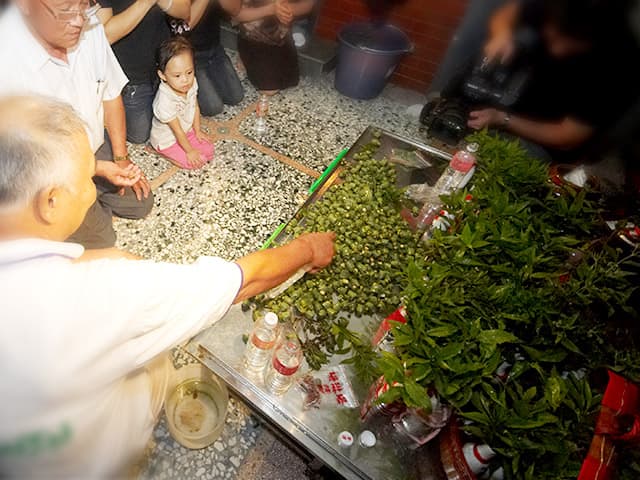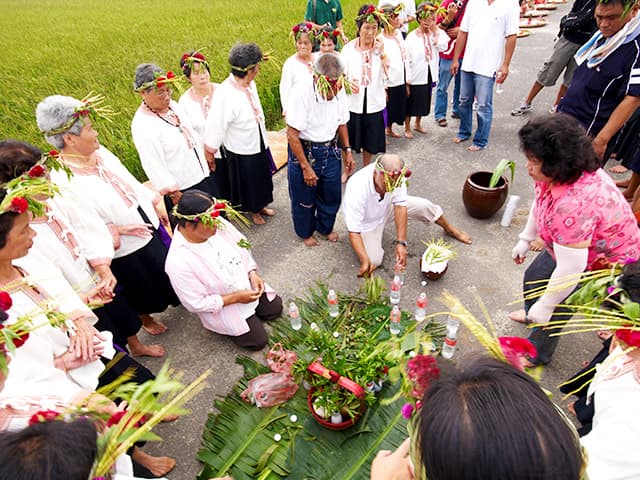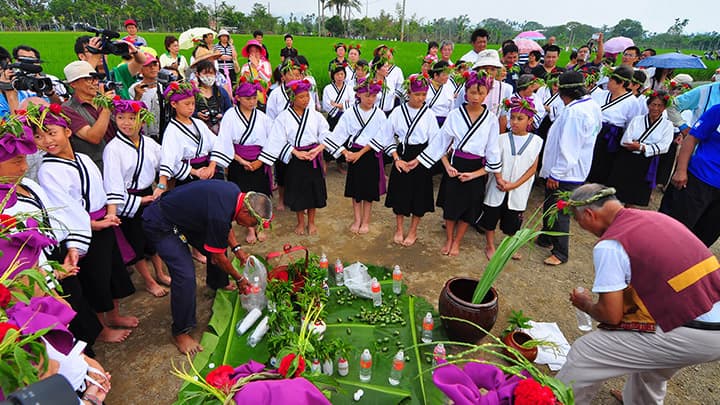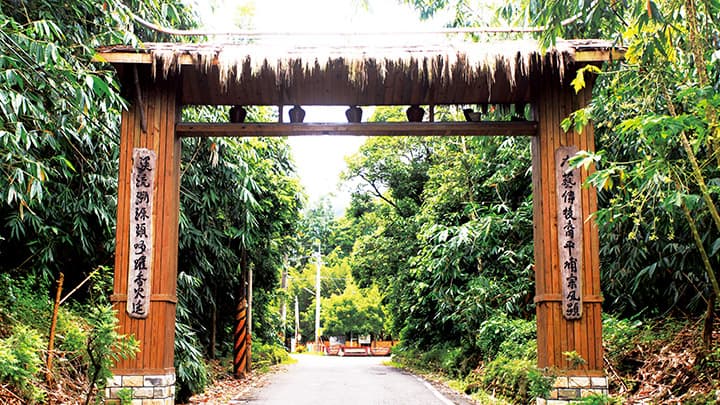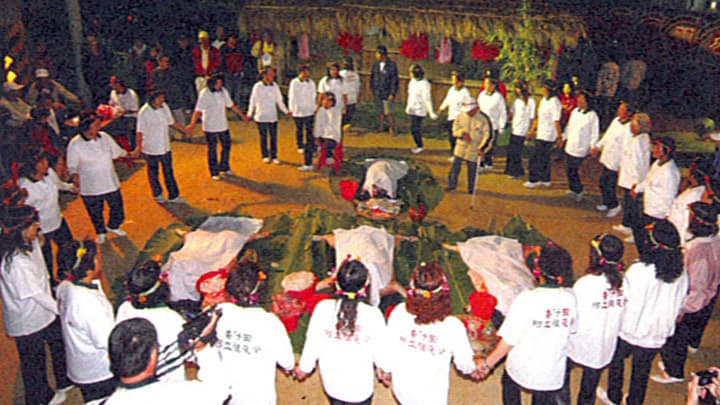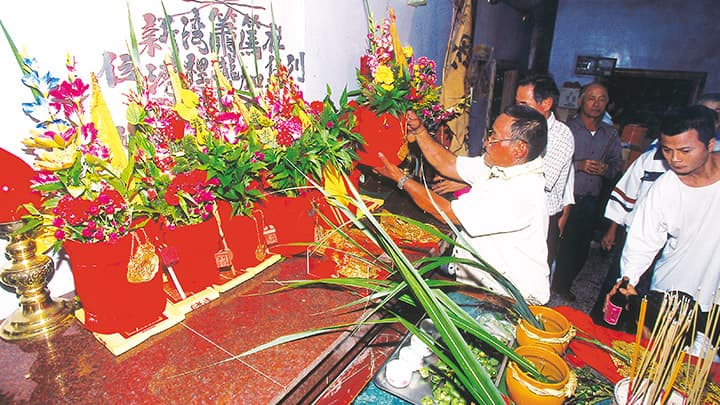Dongshan Township Jibeishua Night Sacrifice
Dongshan Township Jibeishua Night Sacrifice
Jibeishua Village is under the jurisdiction of the Dongshan Dist. Administration. It is southwest of Liouying Village and Siaojiaotuei, with its borders reaching to Gueichongsi. The outside of the village is surrounded by the Jianan Canal. In the village, the houses are concentrated, and the roads are well-regulated. Most of the residents are farmers, and their main crop is rice. Secondary crops include fruits such as sweet melons, tomatoes, and papayas.
Over 360 households live in the village, which has a population of over 1,500 people. The most common surname is "Duan", and about one third of the residents have this surname. The next most common surnames are "Pan", "Li" and "Cheng".
Almost all of the residents worship the "Alimu" ancestor. Every household, without exception, has a family altar where they worship Alimu. This phenomenon of the concentration of a religious belief to one certain area is without comparison in Taiwan.
The Main Activities of Jibeishua
The Ritual Changing of the Water:
On the first and 15th day of the month, a person is assigned to change the water in the ritual vessels of the public sacrifice place, and to clean these vessels. On those days, the locals go to the public sacrifice place to perform a three "siang" ceremony to Alimu. (The term "siang" refers to the power of the gods.)
Panzih New Year:
The 29th day of the third lunar month is Alimu's birthday. It is also called the "Panzih New Year". Although no large ceremony takes place on Alimu's birthday, the villagers will all prepare sacrificial products such as wine and betel nuts, and use them to worship Alimu at the public sacrifice place.
Releasing of the Siang (the power of the gods):
On the first day of the seventh lunar month, a ceremony to release the siang is conducted. This means that the siang spirits held in the ritual vessels will be let out. When the siang spirits are released, a "Seven Star Peace Ceremony" must be conducted at the large public sacrifice place. Seven sugar cane leaves, representing seven stars, are placed around the public sacrifice place, and incantations are recited over them. This prevents the released siang spirits from disturbing the public sacrifice place.
Pudu Ceremony:
This ceremony takes place after noon on the 29th day of the seventh lunar month. The villagers must prepare Pudu sacrificial items which should include certain grains. In the evening, a ceremonial gong is sounded to welcome the Anzu, Angong, and Alimu ancestors. The priest holds the gong, sounding it for the village. This is to inform the released siang spirits to return to the ritual vessels. This is similar to a Taoist ritual performed by the Han Chinese.
Opening Chant Siang Ceremony:
Every year during the evening of the 15th day of the eighth lunar month, the "Opening Chant Siang" ceremony takes place. This is when the Jibeishua residents start practicing the chants to be used during the night sacrifice. Before they start practicing, nobody needs to first perform a three "siang" ceremony to Alimu.
"Night sacrifice" and "Calling of the sea"
Originally called "Jibeishua", Donghe Village is located near Dongshan Dist. in Tainan City. The Alimu religion that they follow is a cultural tradition that was originally passed down by the Siaolong sub-tribe of the Siraya Pingpu people. Every year on the fifth day of the ninth lunar month, a day to commemorate the ancestors' safe arrival in Taiwan is celebrated. However, the local elderly people claim that this is also the birthday of Alimu. This has now become a major yearly event in Jibeishua. The sacrificial activities mostly include the "night sacrifice" and the "calling of the sea". The local deity Wanggongwang is worshipped at this night sacrifice. While Alimu is related to the ancestral spirits religion of all the Taiwan Aboriginals, the "calling of the sea" worship has been developed solely by the people of Jibeishua, and can be traced back to the ceremonies of the Siaolong peoples.
Night sacrifice
Calling of the sea
The night sacrifice procedures
The night sacrifice usually takes place on the fifth day of the ninth lunar month.
The night sacrifice procedures are as follows:
The pig plays an important role in the activities of the night sacrifice
In past times, the pig was killed during the ceremony, and then sacrificed to Alimu. However, nowadays it is already killed before it is bought, and then placed in advance on a bamboo frame especially made for the ceremony.
The gods are asked to join the ceremony, and the pig is offered and then fed wine
The wangyi recites a prayer, and asks Alizu, Alimu and Taishang-Laojyun (the Great Ancestor) to join the ceremony. Then the wangyi pours wine into the pig's mouth three times.
Reasons for Making the Sacrifice, and Use of Fire to Drive out Evil Spirits
The wangyi will ask the people sacrificing the pig to state their reasons for doing so, and then pass on this information to Alimu. Then he will light a straw stick and use it to hit the pig in order to drive out evil spirits, and offer the pig to Alimu.
Cloth Covering Ritual
The pig"s body is covered with a large white cloth. This is to let the other spirits know that the pig is being sacrificed to Alimu, and also to prevent mosquitoes and flies from defiling the pig.
Toasting the Ancestral Spirits
The wangyi presiding over the sacrifice ceremony kneels and worships in front of the pig. Then rice wine is poured into an earthen jar and a ritual cup, and a toast is made to the ancestral spirits. The Toasting the Ancestral Spirits ritual is divided into 30 segments and this ritual is done five times in succession.
The Chanting Celebrations
After the toasting of the ancestral spirits is done five times, the chanting ceremony begins.
Request for Instructions on Throwing the Grass
After the wangyi completes the toasting of the ancestral spirits five times, he will cut a betel nut in half to enquire whether or not Alizu is satisfied with the ceremony, and whether or not the pig is acceptable. If it is accepted, then the ceremony can continue.
The Turning of the Pig for Acceptance
The wangyi uses the reverse side of a knife to hit the pig's head, and lifts the large white cloth. The people then turn the pig around, and make gestures to all parts of the pig to show that the checking and accepting of the sacrifice is complete. According to the rules of Jibeishua, no matter whether the pig has been sacrificed personally by someone, or bought already dead, the pig's head must remain, so that the next day it can be used to complete whatever promise has been made by the person sacrificing the pig. Only then is the promise considered to be fulfilled.
